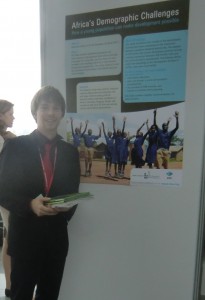The International Family Planning Conference in Ethiopia, a huge conference bringing NGO’s, political activists and state members that are working in the field of SRHR together, took place in Ethiopia in November 2013. And I had the pleasure to take part.

Me at the poster session
DSW had a very active role in this conference, hosting quite a few events and side-meetings. For my part I was presenting a poster which displayed our successful study on African Demographic Challenges that we created with the Berlin-Institut in 2011/2012. As no other study so far, it shows the huge chances that African countries can have for development when they invest in SRHR. You can download it here.
While the conference was over after four days for most of the participants, I had the chance to spend a few more days in Ethiopia visiting some of our projects. After a long trip from Addis Ababa with a modern bus through the high plateau of Ethiopia, I arrived in Bahar Dar, which is near Lake Tana. If you’ve ever been in Ethiopia, you’ll probably know the place. And if you’re looking on a map, you recognize it, as it´s the only big blue spot on the Ethiopian map in the north!
As DSW takes part in a lot of projects in this region, we have a field office in Bahar Dar. I met with Driss and Takele and we visited an impressive project in a small district called Debub Achefer: The Women and Girls Empowernment Project, in short –WOGE.
Almost 200 women are involved in this project. And they have all formed groups and started their own businesses. I met a few of them and they told me how this project has changed their lives. One of them was Mulu. She is 20 years old and now owns a café and leads her group. It is of course not comparable to the chic coffee bars that you can find in the inner city of Berlin or Paris. But you get coffee there; and it’s an original Ethiopian one. So taste of the coffee definitely surpasses the interior design from my European point of view.

Panorama of one of the farming fields from a WOGE group

Together with Mulu in her café
Some of the women in the group take care of the serving; some do the book-keeping. They meet every week and discuss how they can do better with their business. And they talk about SRHR. These two pillars, SRHR and individual economic improvement, are to my mind two essential of what is needed for a real empowerment of women.
Almost all of these women had great ideas in the past. And now, with the help of some training and a bit of financing, they are able to realize their ideas. And they are not just learning how to start a business, but also how to maintain it.
The business survival strategy of Mulu’s group for instance is extremely clever: their café is not in the center of a small town, it’s rather in the outskirts where a new hospital is being built at the moment. So the construction workers told me, that they come to the café every day to get some drinks and food. Later, when the hospital is open, staff members of the hospital and also patients will be their customers.
Continuing our tour through Debub Achfer, we stopped at nearly every corner, because there were other women’s groups that participated in the project. Some were farming, some were cattle breeding, some were producing and selling traditional clothes, etc.

Women from another group produce and sell traditional clothes
The last stop was the resource center, where the women participating in the project have the possibility to access to internet, develop computer skills in general, and check the local prices.
The most impressive thing to me was that a lot of these women were living with HIV. And with the help of their group and their business, their work is not just giving them the money to afford the necessary medicine including the travel costs to the next health center. It also gives them a new lease of life in a society that’s becoming more open-minded, as women told me before we left.
Although working in this organisation, I sometimes doubted in the past if a project like this could have such an impact on a whole community. I guess I was wrong. 😉

